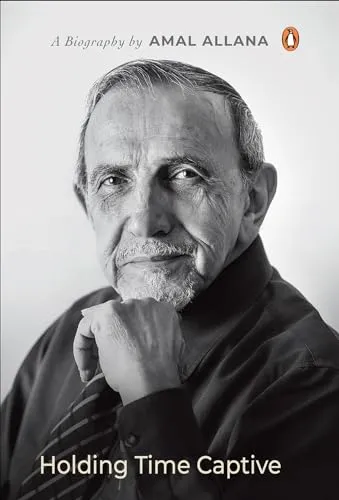
Impact
Ebrahim Alkazi, a name synonymous with the transformation of Indian theatre, was not just a director and teacher but a visionary who held time captive through his profound contributions to the arts. As the director of the National School of Drama (NSD) for over 15 years, Alkazi reshaped the landscape of Indian theatre, blending traditional Indian forms with modernist techniques. His work transcended the temporal boundaries of theatre, making a lasting impact on generations of artists and audiences alike.
Table of Contents
Early Life and Influences
Born in Pune in 1925 to a Saudi Arabian father and a Kuwaiti mother, Ebrahim Alkazi’s multicultural background exposed him to a rich tapestry of cultural influences. His early education at St. Vincent’s High School in Pune, followed by studies at Wilson College, Mumbai, and then at the Royal Academy of Dramatic Art (RADA) in London, laid the foundation for his lifelong engagement with the arts. At RADA, Alkazi was exposed to the works of European masters such as Brecht, Ibsen, and Shakespeare, which would later influence his own theatrical style.
Upon his return to India, Alkazi’s early experiments in theatre were marked by a desire to create a form that was distinctly Indian yet universal in its appeal. His early productions, which were often staged in unconventional spaces, demonstrated his ability to merge Western theatrical techniques with Indian narratives, thereby creating a new idiom in Indian theatre.
The National School of Drama and Alkazi’s Vision
In 1962, Alkazi took the helm of the National School of Drama, and it was here that he left an indelible mark on Indian theatre. Under his leadership, NSD became a crucible for theatrical innovation and experimentation. Alkazi’s tenure at NSD is often referred to as the ‘golden age’ of Indian theatre, and for good reason. He introduced rigorous training programs, focusing on all aspects of theatre, including acting, direction, set design, and lighting. Alkazi’s approach was holistic; he believed that a well-rounded theatre practitioner should be well-versed in both the technical and artistic aspects of the craft.
One of Alkazi’s most significant contributions was his emphasis on research and the use of historical and cultural contexts in theatre. He encouraged his students to delve into the history, myths, and folklore of India and to use this knowledge to create performances that were deeply rooted in Indian traditions while also resonating with contemporary audiences. His productions of classic Indian plays, such as Girish Karnad’s “Tughlaq” and Dharamvir Bharati’s “Andha Yug,” are still considered milestones in Indian theatre.
The Theatrical Master: Crafting Time and Space
Alkazi’s directorial style was marked by his meticulous attention to detail and his ability to manipulate time and space within his productions. His use of lighting, set design, and choreography was revolutionary for Indian theatre. For instance, his production of “Tughlaq,” staged at the Purana Qila in Delhi, transformed the ancient fort into a living character within the play. The vast spaces of the fort were used to amplify the themes of the play, with actors moving through different levels and distances, creating a dynamic and immersive experience for the audience.
Through such innovative staging, Alkazi effectively held time captive, creating a timeless quality in his productions. His use of space was not merely physical but also symbolic, with each element of the set contributing to the narrative in a meaningful way. His plays often transcended the confines of the proscenium stage, creating a dialogue between the performance and the audience, between the past and the present.
A Legacy Beyond Theatre
Ebrahim Alkazi’s influence extended beyond the realm of theatre. As a mentor and teacher, he shaped the careers of some of India’s most celebrated actors and directors, including Naseeruddin Shah, Om Puri, and Rohini Hattangadi. His students remember him not just as a teacher but as a guide who instilled in them a deep respect for the arts and an unyielding commitment to their craft.
Alkazi was also a passionate art collector and connoisseur. His collection of photographs, paintings, and other works of art, which he meticulously curated over the years, is a testament to his deep appreciation for visual culture. In 1977, he established the Art Heritage Gallery in New Delhi, which became a platform for both emerging and established artists. His contribution to the visual arts further cemented his legacy as a cultural custodian, someone who recognized the importance of preserving and promoting India’s artistic heritage.
Conclusion: The Timelessness of Ebrahim Alkazi’s Legacy
Ebrahim Alkazi’s life and work exemplify the ability of art to transcend time. Through his innovative productions, his dedication to theatre education, and his contributions to the visual arts, Alkazi captured the essence of Indian culture and history, presenting it in a way that remains relevant to contemporary audiences. His influence continues to be felt, not only in the world of theatre but in the broader cultural landscape of India.
Alkazi’s legacy is one of vision, discipline, and an unwavering belief in the power of the arts to shape society. By holding time captive in his works, Ebrahim Alkazi ensured that his contributions would resonate across generations, inspiring future artists to push the boundaries of creativity and innovation.









